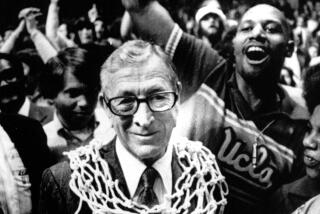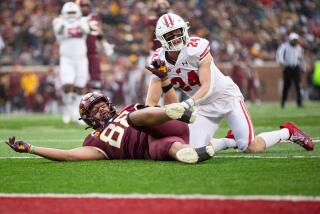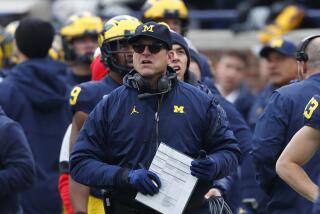Final Four Host Minnesota Cleaning Up Image
- Share via
MINNEAPOLIS — Members of the NCAA championships committee gulped when news broke two years ago of an academic scandal at Minnesota, already chosen as host of the 2001 Final Four.
Should a tainted basketball program be associated with the NCAA’s showcase event?
“The question was raised and soon dismissed,” NCAA senior vice president Tom Jernstedt said.
The committee continued along the Road to Minneapolis, Jernstedt said, because of its confidence in a Minnesota group that also was the host of the 1992 Final Four.
Jeff Schemmel, who has headed the school’s Final Four efforts, said the case shouldn’t be an issue this weekend.
“It’s all too encompassing an event to be focused on a three-person scandal,” said Schemmel, a senior associate athletic director at Minnesota.
The Gophers played in the 1997 Final Four, but any evidence of that has been removed from the school’s media guides and trophy cases. The elimination of those records was part of the penalty for what the NCAA said was the worst case of academic fraud uncovered in two decades.
Jan Gangelhoff, a former office manager in the academic office, said she did more than 400 pieces of work for at least 18 players from 1993 to 1998, allegedly in coordination with former academic counselor Alonzo Newby.
Former Gophers coach Clem Haskins has maintained his innocence, but he’s been portrayed as a man who was beyond the control of his superiors and abused his power to maintain his players’ eligibility.
Haskins is being sued by the university for the $1.5 million he was given when he resigned in June 1999. Others who lost jobs were athletic director Mark Dienhart, who resigned in November 1999 and recently accepted a position at St. Thomas University in St. Paul; and the vice president for athletics and student development, McKinley Boston, who is working with a youth recreation program in Minneapolis.
The Gophers are serving the first of four years on probation, and the basketball program will lose five scholarships over the next three seasons.
Minnesota president Mark Yudof’s call for NCAA academic reform has been met by resistance. His proposal would bar freshmen from eligibility and take scholarships away from schools whose athletes leave without being in good academic standing.
“It’s not a position he’s abandoned,” Minnesota vice president and chief of staff Tonya Moten Brown said.
She said the school’s compliance department has been given greater authority and the focus of the academic department has been moved outside the athletic department. The new academic safeguards prevent coach Dan Monson from even speaking directly to professors about his players’ grades or attendance.
The present basketball players, who were not involved in the scandal, responded when the school lifted its own postseason ban by reaching the second round of the National Invitation Tournament, which seemed out of reach when the season began.
Priorities seem to be returning to order as the black eye on the program heals.
“There are 30 jobs open across the country,” Monson said. “I don’t think they’re open because the coaches didn’t graduate players. For about 27 of those 30 openings, they didn’t win enough basketball games.
“The program is going to be held accountable now for things other than wins and losses. I knew they couldn’t afford to judge me just by wins and losses.”
More to Read
Go beyond the scoreboard
Get the latest on L.A.'s teams in the daily Sports Report newsletter.
You may occasionally receive promotional content from the Los Angeles Times.










